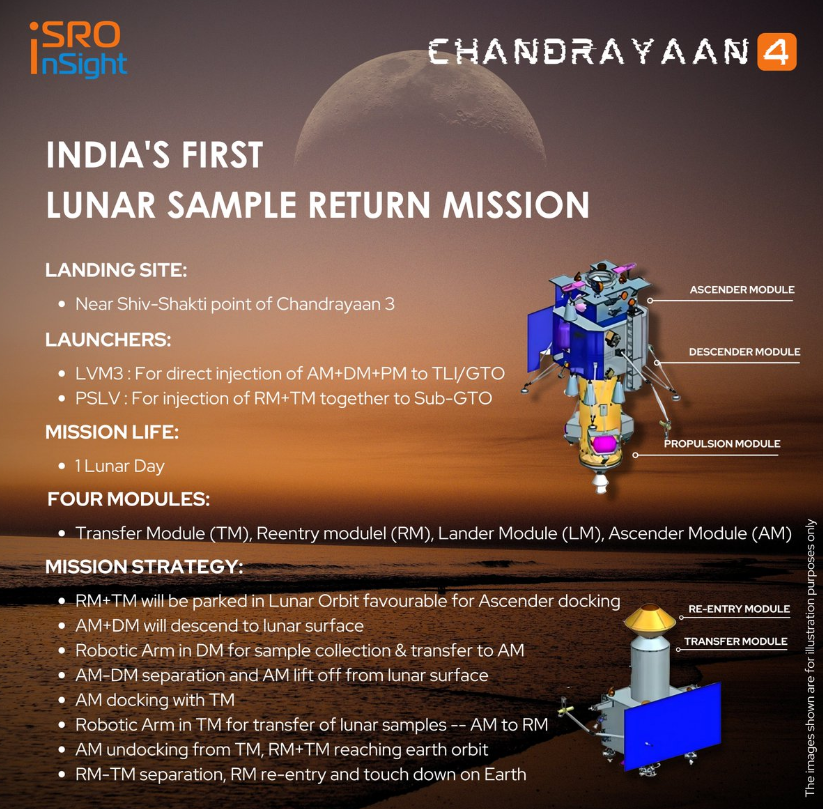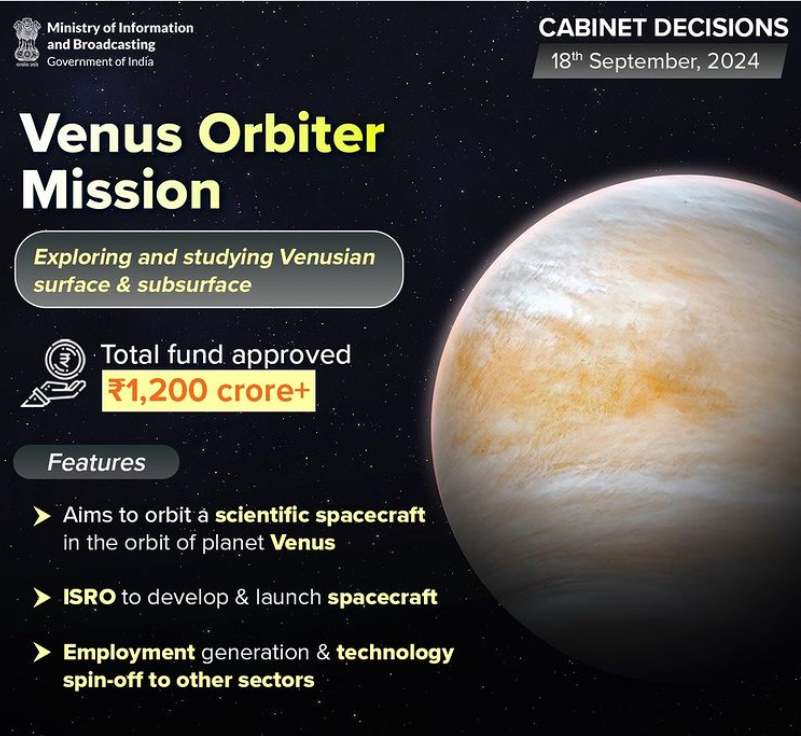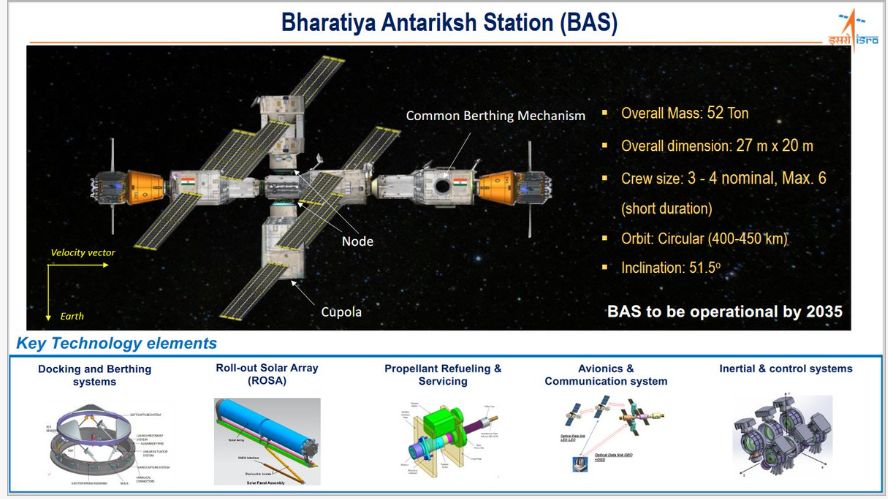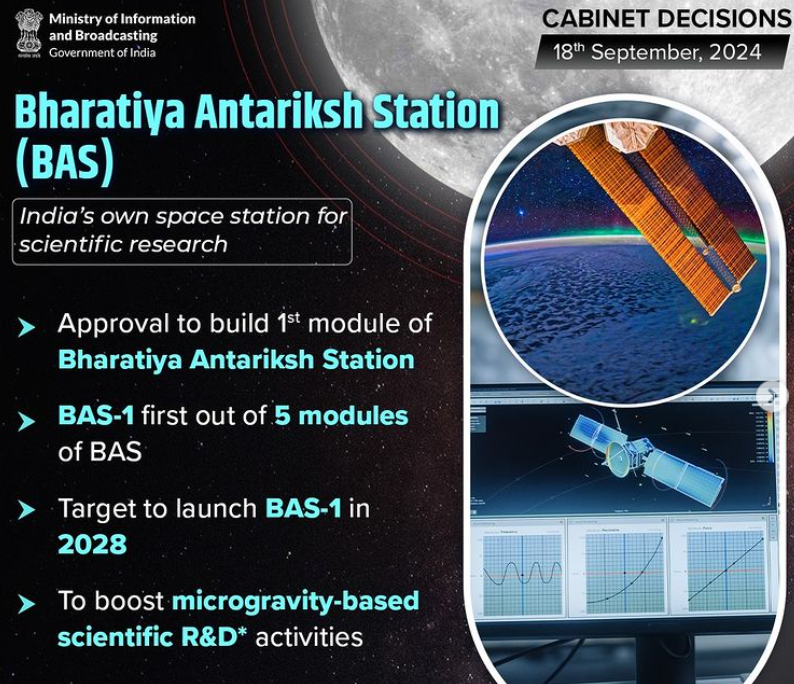25 September 2024 : PIB Summary For UPSC
1. Expanding Horizons in Space Sector: From Lunar Exploration to a National Space Station
(Source – https://pib.gov.in/PressReleseDetail.aspx?PRID=2058137 )
| Topic: GS3 – Science and Technology |
| Context |
|
Introduction
- India is embarking on an ambitious journey in space exploration, as evidenced by a series of visionary missions and projects approved by the Union Cabinet.
- Spearheaded by the Indian Space Research Organisation (ISRO), these initiatives highlight the nation’s dedication to becoming a leader in space technology and research.
Chandrayaan-4 Mission

- The Chandrayaan-4 mission is designed to develop and demonstrate essential technologies for returning to Earth after a successful lunar landing.
- The mission will focus on collecting lunar samples for analysis on Earth, crucial for establishing India’s capabilities for future human missions to the Moon, projected for 2040.
- Key technologies for docking, undocking, landing, and safe return to Earth will be showcased during this mission, alongside lunar sample collection.
- The mission will be managed by ISRO and is expected to be completed within 36 months post-approval, with strong participation from industry and academia.
- All critical technologies will be developed domestically, generating high employment potential and technological spin-offs for various sectors.
- The total funding requirement is ₹2,104.06 crore, which encompasses spacecraft development, two launch vehicle missions of LVM3, and additional support for deep space network operations.
Venus Orbiter Mission

- The Venus Orbiter Mission (VOM) marks a significant advancement in India’s planetary exploration beyond the Moon and Mars.
- As the planet closest to Earth, Venus offers a unique opportunity to study planetary environments that evolve under varying conditions.
- The mission aims to place a scientific spacecraft in orbit around Venus, enhancing understanding of its surface, subsurface, and atmospheric processes.
- Investigating the causes behind Venus’s transformation from a potentially habitable planet will provide crucial insights into both Venus and Earth’s evolutionary paths.
- Scheduled for launch in March 2028, the mission is backed by an approved budget of ₹1,236 crore, which includes ₹824 crore for spacecraft development.
- The collaboration with Indian industries will not only bolster employment but also yield technological benefits across sectors.
Bharatiya Antariksh Station

- The construction of the first module of the Bharatiya Antariksh Station (BAS-1) marks a critical expansion of the Gaganyaan program.
- The expanded scope of Gaganyaan includes missions aimed at validating technologies necessary for building and operating the Indian space station.
- The program’s vision now encompasses establishing an operational space station by 2035 and launching an Indian crewed mission to the Moon by 2040.
- ISRO will lead the Gaganyaan program, collaborating closely with industry, academia, and national agencies.

Funding and Economic Impact
- The revised Gaganyaan program has a total funding allocation of ₹20,193 crore, including ₹11,170 crore in newly approved funding.
- The program is designed to inspire youth towards careers in science and technology, yielding technological advancements that benefit society.
Union Budget 2024-25
- The Union Budget 2024-25 has introduced a ₹1,000 crore Venture Capital Fund for space startups, designed to stimulate growth in India’s burgeoning space sector.
Conclusion
- India’s space program is entering an exhilarating phase marked by groundbreaking missions and technological advancements.
- The approval of Chandrayaan-4, the Venus Orbiter Mission, and the Bharatiya Antariksh Station illustrates the government’s commitment to enhancing India’s space exploration capabilities.
- These initiatives not only elevate India’s standing in the global space arena but also catalyse technological innovation and employment opportunities.
- As India progresses with its space ambitions, these missions will secure its position at the forefront of scientific discovery and space research for years to come.
| PYQ: What is India’s plan to have its own space staSon and how will it benefit our space programme? (150 words/10m) (UPSC CSE (M) GS-3 2019) |
| Practice Question: Discuss the significance of India’s recent initiatives in space exploration, particularly the Chandrayaan-4 mission and the Venus Orbiter Mission. What challenges do you foresee in implementing these projects? (250 Words /15 marks) |


